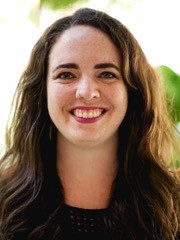
When Fiona O’Leary Sloan arrived in Lima, Peru at 2 AM, she realized that she didn’t have a bed to sleep in. “The only thing I had booked was my flight to Lima and my hostel,” Fiona says, laughing, “and I had booked the wrong days, so really I had planned nothing.” For Fiona, the visit to Peru was the beginning of a months-long, worldwide journey that would shape her outlook and influence her decision to apply to Asia School of Business.
But it was far from her first blush with travel and its transformative effects. “I’m thankful I had a mother who prioritized travel,” she says. “Because of that, I was exposed to a diverse group of people from a young age. It made me a better person, less judgmental.” After traveling with her family throughout her childhood, Fiona studied abroad for the first time at the age of 16, which helped her become more flexible and adaptable to unfamiliar territory.
Solo travel has never intimidated her. In many ways, she prefers it to travel with friends because it allows her to spend time with people from all walks of life. Having stayed at over 100 hostels, she has formed friendships everywhere she’s traveled. When she returned to the United States after months of traveling, Fiona knew her next step would involve living in another country, possibly in the developing world.
Having already traveled around Southeast Asia, she applied to ASB for the chance to gain an insider’s perspective of business dynamics in the region. “ASB is located in an important market that’s growing rapidly with a lot of entrepreneurial spirit,” she says. “Here, there’s the sense that you can go farther, faster.” For some, this could mean being promoted faster due to the rising demand for talent. For others, it means more market opportunities for starting and growing businesses.
For Fiona, it means that someone with her skills and interests has a lot more freedom to experiment with unconventional solutions to business, and societal, problems. Long interested in social impact, Fiona received her first Master’s degree in Public Service from the Clinton School of Public Service. Though the program had taught her to measure and report on the social impact of organizations, she knew she would not be able to incite widespread societal change without also having business acumen.
For her, business school was a natural next step. She developed this mindset during her most recent job at an urban planning consultancy in Detroit, a for-profit company working predominantly with for-profit partners. Through her work, she witnessed how coordinating big contracts for small businesses could singlehandedly keep them afloat. “I had been in the non-profit space before, and this made me realize that business often has a greater impact due to fewer restrictions,” she says.
To Fiona, business and travel aren’t separate interests, but go hand-in-hand when it comes to developing the skills necessary for success. She values solo travel as a way to practice making immediate decisions with little information or counsel to cultivate intuition. She says that the groundless and uncertain nature of traveling often feels similar to navigating a startup environment.
Much like business school, travel has a way of uncovering the hidden assumptions and biases that day-to-day decision-making ignores. When habitual ways of living and working are reexamined, there is a greater potential for unconventional-yet-effective solutions. Fiona argues that it’s all based on being in an unfamiliar environment. “Put me in a grocery store in the US and I’d buy the same things I buy every week, but put me in a grocery store in South America and I would walk out with some weird things,” she says.
And at ASB, business and travel have become even more closely intertwined, with Action Learning projects taking place throughout Southeast Asia. Every semester provides an opportunity for students to step out of their comfort zones and learn about a new country, industry, or function, and often all three at once. Students also work in different groups for each project with classmates from different backgrounds and nationalities, a unique aspect of the MBA program that Fiona says most shaped her outlook.
Being able to share differences in perspective and gain exposure to foreign concepts has been invaluable for her as well as her classmates. In Fiona’s free time, she continues to seek new experiences by traveling throughout Southeast Asia and beyond. She appreciates the stark differences in culture between each country in the region despite their close proximities to one another.
Whether trekking through temples in Cambodia or sampling Vietnamese cuisine, Fiona enjoys the wide variety of experiences accessible to her, noting that from Kuala Lumpur, these experiences are much more accessible and affordable.
Even after she graduates from the MBA program in April, Fiona has vowed never to stop traveling, especially in the developing world. She hopes for her next role to have an international focus so that she can continue to gain exposure to new environments. As she says, “Travel in every way has been my most important teacher, because it’s taught me about myself.”





